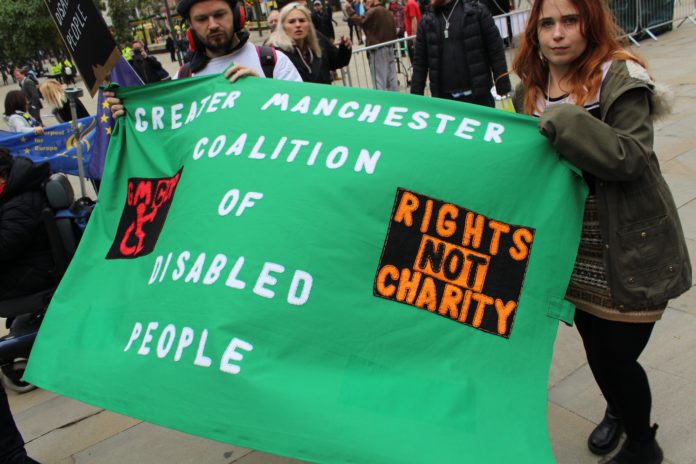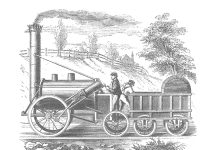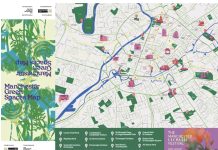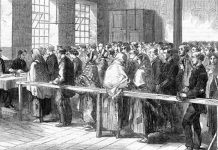an exhibition will open at People’s History Museum (PHM) that looks at the past, present and future of disabled activism. Nothing About Us Without Us has been co-produced with groups, campaigners and individuals to highlight the story of disabled people’s activism and reflect on how this has been represented in history.
The exhibition is one of a series of community exhibitions that responds to the theme of protest; which is the focus of the museum’s programme throughout 2019. Following an open call for submissions, Nothing About Us Without Us is the result of People’s History Museum working with organisations, individuals and collectives including Disabled People Against Cuts (DPAC), Greater Manchester Coalition of Disabled People (GMCDP), Pure Art Studio, Quiet Riot and Venture Arts.
The exhibition begins with a timeline mapping how disabled people’s organisations have campaigned for equality since the late 1800s. The timeline is based on the work of Linda Marsh and Brian Hilton from the Greater Manchester Coalition of Disabled People (GMCDP), and includes key milestones such as the recognition of British Sign Language as an official language in 2003 and the emergence of neurodiversity as a concept in 1996.
Oral recordings by disabled activists provide an insight into their experiences from protesting on the streets to campaigning from their living rooms.
This is also a very visual exhibition with banners, placards and other materials that have played an important role in campaigns led by disabled activists such as the Save the Independent Living Fund banner, which has been used on multiple protests across Britain. A large Not Dead Yet banner highlights how disabled people have protested against assisted suicide, believing this to be an attempt to legitimise the killing of terminally ill and disabled people.
The exhibition also includes two t-shirts that belonged to leading disability rights campaigner Lorraine Gradwell (1953 – 2017), who since the 1980s was at the forefront of campaigns at a national level, including her role in founding GMCDP and Breakthrough UK.
Nothing About Us Without Us also features very current campaigns. The Autistic Pride Flag by Joseph Redford, tells of the autistic rights movement and the campaign for greater acceptance of autistic behaviours. It also challenges those organisations that look to cure autism or use intervention therapies to modify behaviour.
Mark Wilson, Exhibitions Officer for People’s History Museum, says, “Our programme of community exhibitions is one of the most important ways in which we highlight the significance of protest and the campaigns that people and communities are driving forward to achieve change. It’s been fascinating to work collaboratively with everyone involved in Nothing About Us Without Us and the result is a really powerful exhibition.”
Throughout 2019 there is a series of community exhibitions at People’s History Museum that represent different stories and perspectives on the past, present and future of protest. The Most Radical Street in Manchester? opening on 20 July 2019 will explore the history of protest spaces and contested sites in Manchester and Salford from the period leading to the Peterloo Massacre to the present day. These sit alongside the museum’s headline exhibition for 2019, Disrupt? Peterloo and Protest (on show until 23 February 2020), whilst across the main galleries the 2019 display of historic and contemporary banners highlight key moments of protest from the museum’s world renowned collection of over 400 political and trade union banners.
People’s History Museum is open seven days a week from 10.00am to 5.00pm, Radical Lates are on the second Thursday each month, open until 8.00pm. The museum is free to enter with a suggested donation of £5. To find out about visiting the museum, its full exhibitions and events programme visit phm.org.uk.







